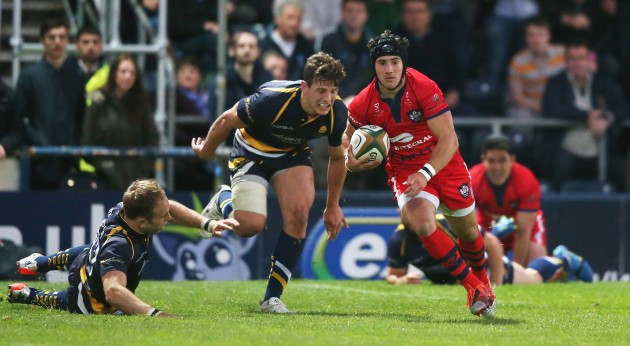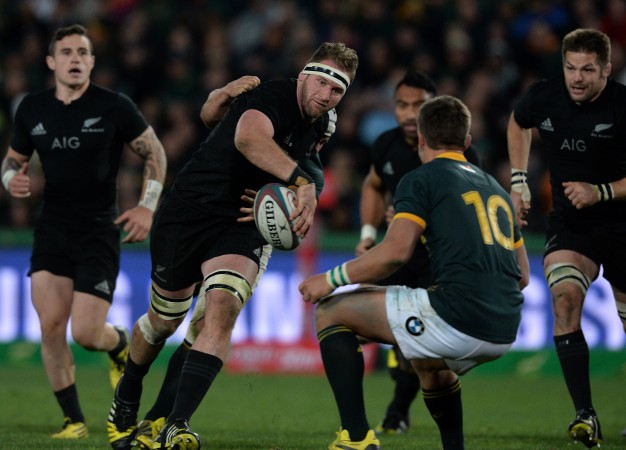Argentina making history, Matthew Morgan's resurgence, the six-point try and ball-handling forwards are all covered in this month's column
Argentina make rugby history
August was largely a month of Rugby World Cup warmups and national coaches carefully pruning their squads like Mister Miyagi tending to a bonsai tree. But last month also saw one of the finest moments in rugby history – Argentina beat the Springboks. It was a remarkable result for the Pumas. It was more than a victory, it was a thumping, made even more glorious that it was in South Africa – it was like watching Mr Miyagi felling a giant redwood with a flamethrower and chainsaw. The result was hugely important for Argentina and rugby as a whole. It proved that rugby can’t be allowed to simply bow to purely commercial considerations and that everything must be done to widen the breadth, appeal and participation of the game. Argentina have taken some serious hidings in The Rugby Championship and many argued that they simply weren’t up to the job, but they are. After four years of perseverance in the toughest competition outside of the Rugby World Cup, the Pumas beat one of the big boys on their own turf and gave hope to all those nations and teams looking to improve and progress. Congratulations Los Pumas!
Matthew Morgan breaks the mould
The last week of August saw Matthew Morgan selected in Warren Gatland’s final squad of 31 – a situation that few, even Morgan himself, would have thought unlikely a few months ago. Morgan doesn’t fit the mould of modern rugby, and he certainly doesn’t fit Warren Gatland’s mould of freakishly large backs. But that is exactly why Matthew Morgan has been selected. At 5ft 8ins and 11 and half stone, he doesn’t fit the mould. You wouldn’t be able to get a mould on him. No sooner had you tried, he’d have stepped on you, gassed you and left you so dazzled that you’d have dropped the mould on the floor and smashed it into tiny pieces.
Many regard Morgan’s inclusion as a risk, a defensive miscalculation and a romantic nod to a bygone age. But it isn’t. Warren Gatland doesn’t exactly do romance. This is a man who has recently dispensed with senior Welsh players with the same warmth and charm of ‘Jigsaw’ from the Saw films. Morgan is in that squad for one reason; to change games, make line breaks and expose tired defensive lines late in the game. Good luck Matthew Morgan.
The importance of ball handling forwards
August once again proved the importance of ball handling forwards, particularly in this year’s Rugby Championship – New Zealand and Australia in particular. Counter attack possession is the best possession in modern rugby. It is the only instance in elite rugby where you gain a guaranteed advantage over the defensive side –primarily because a nano-second prior they were the attacking side and setup to achieve a completely different objective. It is this rapid switch from defence to attack that requires forwards to be able to handle the ball confidently and at speed. In a counter attack situation ruck guards, such as props and locks, become scrum halves, the second ruck guard is often the first receiver and flankers and hookers become centres.
Without the ability to move the ball efficiently through the hands these turnover opportunities are often squandered. The All Blacks have the finest set of ball handling forwards in the world and control the ball with the fluidity of liquid mercury. If anyone is planning on beating the ABs in the Rugby World Cup, they will need to match the skillset of their forwards.
Welsh Premiership trial new ‘points’ method
As of this Saturday, the Welsh Premiership will trial a new points system where a try is worth six points and all kicks, be it a conversion, goal kicks, or drop goal will be worth two points. If successful it could have an impact on the game as a whole. It is a very positive move and will decrease the incentive of opting for ‘the posts’ and instead encourage teams to take attacking scrums and lineouts – particularly in the ‘redzone’. It could also see a return to the organised ‘penalty move’, a glorious and often ingenious spectacle which sadly died with the amateur game. However, whilst the increase in points for crossing the line will have undoubted benefits, the decreasing of points for a goal kick, will require very strong use of the yellow card. Two point goal kicks will lead to an increase of infringements at the breakdown – the fact that the punishment has been reduced will mean that more ‘crimes’ occur. It will require referees to use yellow cards prudently and discourage teams from slowing the breakdown or killing the ball outright. The success of this law trial arguably rests more with the referees, than the players.
The cruel reality of rugby ‘employment’.
Becoming a test rugby player is a genuine privilege and something that all players and supporters dream of. Regardless of age we all fantasise about pulling on the colours of our country and playing at our national stadium. Which reminds me, this is the 20th Welsh squad for which I have been overlooked and I’m not happy about it. However, whilst becoming a test player seems like the ultimate career, August showed that it does have its drawbacks – employment issues that you simply don’t encounter in ‘normal’ jobs. Put simply, if the coaches don’t want you, you are sacked on the spot.

Public cut: Danny Cipriani is one of several big-name stars to have been omitted from World Cup squads
There are no written warnings, no consultations with the human resource department and no right to appeal. The impact of this sacking affects players’ earnings from test appearances fees, sponsorship and all of the trappings that come with being an elite athlete – not to mention self-esteem. Not only that, but your ‘sacking’ is plastered all over the media for weeks to come, and then the public, via social media, subject you to a digital public stoning. On second thoughts I’m not sure that I do want to play for my country, which is the only thing stopping me…







